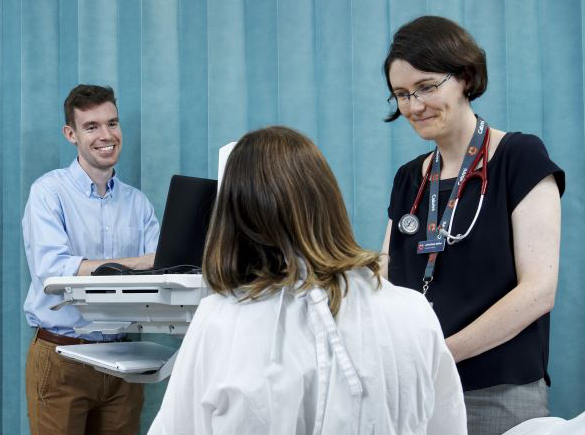 A new role in the health system could improve efficiencies in emergency departments and decrease the time patients spend in emergency departments, following a successful trial in hospitals throughout Victoria recently published in The British Medical Journal.
A new role in the health system could improve efficiencies in emergency departments and decrease the time patients spend in emergency departments, following a successful trial in hospitals throughout Victoria recently published in The British Medical Journal.
Scribes are trained to complete clerical data entry associated with a patient’s visit to the emergency department, allowing doctors to concentrate on core medical tasks instead.
In the first trial of its kind in Australia, locally-trained scribes were used in five hospital emergency departments across the state of Victoria, Australia [including]Cabrini Malvern. Scribes were present during the time when a patient consults with a doctor and assisted in writing up patient notes, in close consultation with the treating doctor.
Currently, Australian emergency department doctors spend nearly 50 per cent of their time typing up patient notes and undertaking other clerical tasks, taking their focus away from core medical tasks like seeing patients.
“Traditionally, a doctor’s role has been focused on patient care but since the introduction of electronic health records, we have become increasingly overloaded with documentation and clerical responsibilities that take us away from our primary duty of care for our patients,” A/Prof Walker said.
“This program has been designed to reduce the administrative workload for physicians and increase the time spent treating patients.”
A/Prof Walker said the use of scribes in emergency departments improved the productivity of emergency doctors and decreased the time spent in the emergency department for patients.
“With the assistance of scribes, doctors were able to treat 25 per cent more patients per shift, which has significant economic and social benefits,” she said. “Our research showed benefits at all of our participating sites, decreasing the total time patients spent in the emergency department by 19 minutes”.
A/Prof Walker said she hoped the research would persuade hospitals to employ scribes in Australia to support emergency physicians by enabling them to safely see more patients.

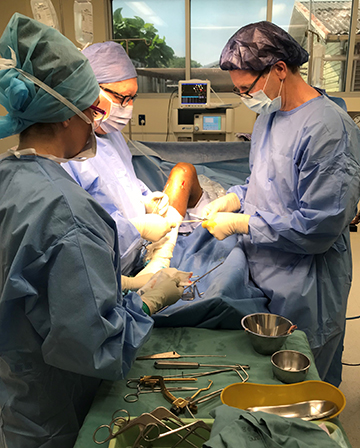
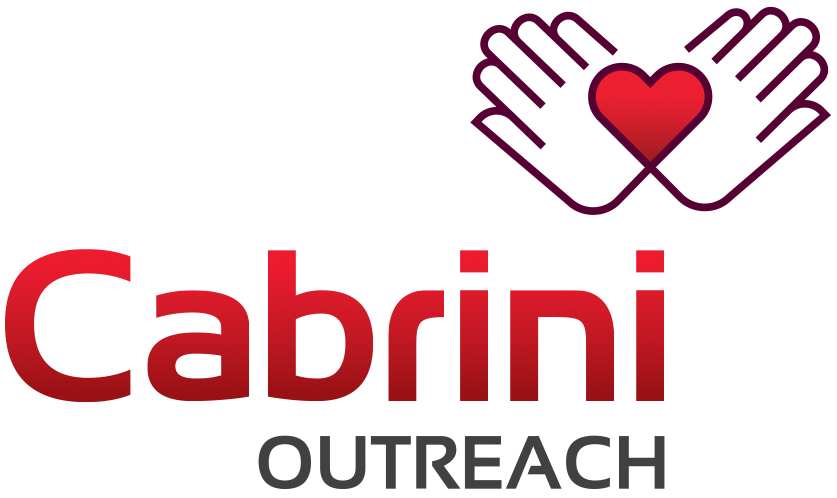 Cabrini’s Asylum Seeker and Refugee Health Hub in Brunswick is helping some of the most vulnerable in our community.
Cabrini’s Asylum Seeker and Refugee Health Hub in Brunswick is helping some of the most vulnerable in our community.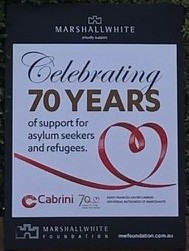 , the Cabrini Asylum Seeker and Refugee Health Hub was opened, to respond to the significant unmet needs for this vulnerable population. The Hub provides free access to primary health and specialist mental health services for newly arrived refugees and people seeking asylum.
, the Cabrini Asylum Seeker and Refugee Health Hub was opened, to respond to the significant unmet needs for this vulnerable population. The Hub provides free access to primary health and specialist mental health services for newly arrived refugees and people seeking asylum.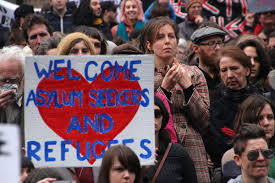
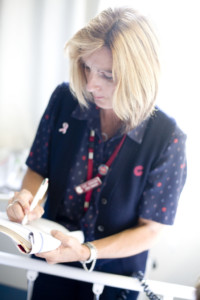 Sue Grasby RN, a nurse manager at Cabrini Malvern, has been awarded Catholic Health Australia’s (CHA) annual Nurse of the Year Award for 2017.
Sue Grasby RN, a nurse manager at Cabrini Malvern, has been awarded Catholic Health Australia’s (CHA) annual Nurse of the Year Award for 2017.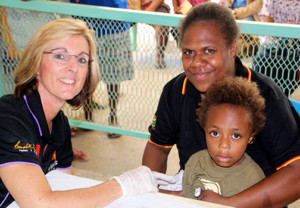 Ms Grasby’s involvement with providing health outreach services in PNG was sparked when she trekked the Kokoda Track with family and friends in 2010. Over eight days, the group passed through many small villages and interacted with local people. The experience provided an understanding of the isolation along the track and lack of access to basic health care and medical treatment.
Ms Grasby’s involvement with providing health outreach services in PNG was sparked when she trekked the Kokoda Track with family and friends in 2010. Over eight days, the group passed through many small villages and interacted with local people. The experience provided an understanding of the isolation along the track and lack of access to basic health care and medical treatment.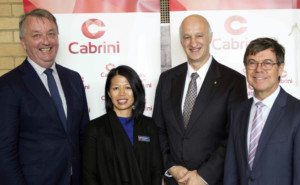 On Wednesday 26 April, the Hon Martin Foley MP, Minister for Mental Health, launched a new specialist mental health service being introduced at the Cabrini Asylum Seeker and Refugee Health Hub in Brunswick.
On Wednesday 26 April, the Hon Martin Foley MP, Minister for Mental Health, launched a new specialist mental health service being introduced at the Cabrini Asylum Seeker and Refugee Health Hub in Brunswick.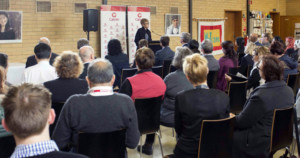
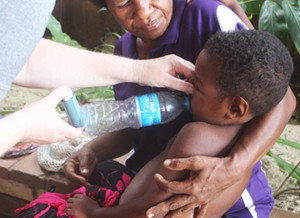 cent of the population who live outside Port Moresby. Most people living in the highlands have never seen a doctor and many rarely see a healthcare worker. So in April 2016, Cabrini nurses Sue Grasby, Anne Marie Robinson, Bianca Di Sciascio and Monica Wallace left Australia for PNG with two other Melbourne nurses, each prepared to do whatever it took to improve the health outlook for those they visited. They travelled with No Roads to Health, an adventure travel company that arranges trips to remote regions for healthcare workers. The adventure is secondary to the purpose of nursing.
cent of the population who live outside Port Moresby. Most people living in the highlands have never seen a doctor and many rarely see a healthcare worker. So in April 2016, Cabrini nurses Sue Grasby, Anne Marie Robinson, Bianca Di Sciascio and Monica Wallace left Australia for PNG with two other Melbourne nurses, each prepared to do whatever it took to improve the health outlook for those they visited. They travelled with No Roads to Health, an adventure travel company that arranges trips to remote regions for healthcare workers. The adventure is secondary to the purpose of nursing. Cabrini’s nurses found the Papua New Guineans to be warm, generous and grateful, smiling broadly despite deprivation and pain. This, and the unstinting hospitality they encountered, made up for the steep, treacherously slippery tracks, the bugs, spiders, lack of electricity and running water and the relentless rain. Some have already booked a return trip. “It was a wonderful way of continuing the missionary vision of Saint Frances Xavier Cabrini, the Italian Sister who founded the congregation that owns and sponsors Cabrini in Australia, by providing care to those who cannot afford it,” says Monica “To give hope that will transform people’s lives – and to do it with Cabrini’s values of compassion, integrity, courage and respect”.
Cabrini’s nurses found the Papua New Guineans to be warm, generous and grateful, smiling broadly despite deprivation and pain. This, and the unstinting hospitality they encountered, made up for the steep, treacherously slippery tracks, the bugs, spiders, lack of electricity and running water and the relentless rain. Some have already booked a return trip. “It was a wonderful way of continuing the missionary vision of Saint Frances Xavier Cabrini, the Italian Sister who founded the congregation that owns and sponsors Cabrini in Australia, by providing care to those who cannot afford it,” says Monica “To give hope that will transform people’s lives – and to do it with Cabrini’s values of compassion, integrity, courage and respect”.